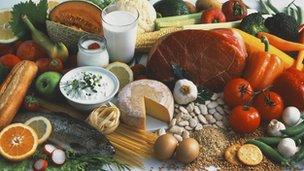Britons failing to reach five-a-day fruit and veg goal
- Published

Fruit and vegetables help provide a healthy, balanced diet, say nutritionists
Fewer than a third of adults and only one in 10 children are eating their recommended "five-a-day" of fruit and vegetables, government figures suggest.
The results, published in the National Diet and Nutrition Survey, show that on average, adults eat only four portions a day.
Only 31% of people aged between 19 and 64 are eating the full five portions recommended for good health, it said.
The survey, of 3,000 people, was conducted for three years up to 2011.
Each person was interviewed and their blood and urine samples examined. They also filled out food diaries.
The researchers also showed that people were not eating enough of foods such as oily fish - which are rich in omega 3 fatty acids, which can reduce the risk of death from heart disease - and their diets' had lower-than-recommended levels of vitamin D and iron.
'Integral to diet'
People were also eating far too much saturated fat, which can lead to high cholesterol levels, and consequently heart disease.
Tracy Parker, dietician at the British Heart Foundation, said: "It's disappointing that a year on there has been no real improvement in the number of young people eating their five-a-day. Fruit and vegetables help young minds and bodies develop and should be an integral part of any teenager's diet.
"It's not just young people though - all age groups are failing to clear the five-a-day bar.
"The nation is consuming too much saturated fat and too many people have high cholesterol - a major risk factor for heart and circulatory disease."
The survey findings are backed up by a recent poll for the World Cancer Research Fund which reported that just one in five Britons eats the recommended levels of fruit and veg.
The Department of Health launched the five-a-day campaign in 2003.
A Department of Health spokesperson said: "The best way to maintain good nutritional status is a healthy balanced diet and a healthy lifestyle including getting some sun to help with vitamin D.
"We encourage people to eat a varied diet containing plenty of fruit, vegetables and starchy foods, choosing wholegrain wherever possible, and some meat, fish, eggs, dairy products and/or non-meat sources of protein."
- Published14 May 2012
- Published16 December 2010